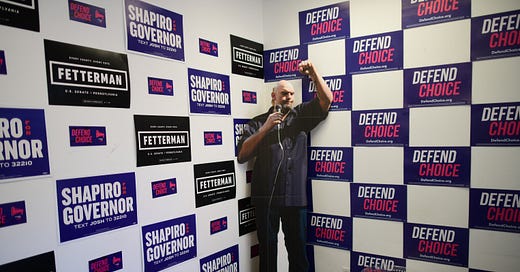
The Free Press

It should now be crystal clear why Democrat John Fetterman refused to take part in more than a single debate with his Republican Senate rival, Mehmet Oz, and why Fetterman insisted on pushing that debate to just two weeks before Election Day—after at least 500,000 Pennsylvania voters had already voted.
Last night’s debate was an unmitigated disaster.
A disaster for Fetterman, Pennsylvania’s lieutenant governor—who appeared confused and could barely manage a coherent sentence, let alone a complete paragraph.
And a disaster for Pennsylvania voters, who didn’t get the tough, substantive debate they deserved, one that would have pushed Oz to explain, among other things, why he was distancing himself from Donald Trump (without whom he wouldn’t be the nominee); his position on abortion; China; and how he plans to bring down gas prices.
Oz had some solid talking points, but they were just that—talking points. But Fetterman lacked even those.
You can watch the whole debate here:
A few examples of what went down:
There was Fetterman’s confusing opening statement.
His refusal to share his medical records.
His simplistic and, at moments, cheerleader-sounding celebration of Roe v. Wade.
And, in perhaps the most baffling moment of the night, his inability to explain his position on fracking:
The Pennsylvania Senate race is among the most important in the country. So, the Fetterman campaign—which seriously limited the candidate’s interaction with constituents and put the kibosh on press gaggles—granted some interviews. Almost all of them were conducted remotely, over Google Hang, with closed captioning. None that we can recall focused on the most important thing about John Fetterman: The fact that the candidate, who suffered from a stroke five months ago, does not appear fit to serve.
Until last week.
Last week, NBC reporter Dasha Burns had the temerity to observe the obvious: John Fetterman has trouble with chit chat. Here is what she said: “In small talk before the interview without captioning, it wasn’t clear that he was understanding our conversation.”
She got crucified for it by any number of journalists with blue checks.
From Kara Swisher: “Sorry to say but I talked to @JohnFetterman for over an hour without stop or any aides and this is just nonsense. Maybe this reporter is just bad at small talk.”
From New York Magazine’s Rebecca Traister, who profiled the candidate: His “comprehension is not at all impaired.” The problem, she explained, is “a hearing/auditory challenge.” She added: “He understands everything.”
Molly Jong-Fast came to Fetterman’s defense, tweeting that, in a recent interview, the candidate “understood everything I was saying and he was funny.”
Connie Schultz, a USAToday columnist and the wife of Democratic Senator Sherrod Brown, observed: “As he continues to recover, @JohnFetterman used technology to help him answer a reporter’s questions. How we as journalists frame this reveals more about us than it does him.”
The Atlantic’s John Hendrickson suggested that the problem wasn’t Fetterman but, well, us. “Part of our culture’s ongoing stigmatization of disability stems from our profound lack of understanding about the variability—and spectrum—of physical and mental challenges.”
And so on.
The NBC reporter was also attacked by Fetterman’s wife, Gisele. She suggested that Burns should be punished for reporting honestly. “I mean, there are consequences for folks in these positions who are any of these isms,” Gisele Fetterman said. “I mean, she was ableist. That’s what she was in her interview. It was appalling to the entire disability community and I think to journalism.” (The Second Lady of Pennsylvania seemed unconcerned with the First Amendment.)
If anything, Burns, who has covered the race extensively, understated just how bad Fetterman’s condition is.
I was in Pennsylvania a few weeks ago to report on the race, and the Fetterman campaign refused to make the candidate available. Now, it’s obvious why they have limited media engagements to friendly venues like MSNBC, New York Magazine and The New York Times—where reporters are, presumably, reticent to report anything that might be viewed as helping Republicans.
But there was no sympathetic journalist on stage with John Fetterman last night. What we were left with was reality. And reality was painful to watch.
Perhaps it shouldn’t come as a surprise that the campaign is blaming the closed captioning system for being “delayed” and “filled with errors.” What’s astonishing is how little so many journalists at some of our most storied news organizations respect normal Americans’ ability to use their eyes and ears.
The spin machine is already whirring away, with journalists claiming that it was the technology that was to blame or that Fetterman was brave to debate Oz or that, as Rebecca Traister put it, Fetterman should be lauded for his “remarkable transparency.” Josh Kraushaar, at Axios, was honest and ballsy enough to report that Democrats on Capitol Hill were left rattled by Fetterman’s performance.
Far from shielding Fetterman from scrutiny, in the end too many journalists in the legacy media have simply revealed—once again—why they cannot be trusted. From Russiagate to the lab leak theory to the riots in the summer of 2020 to the effect of school closures during the pandemic, reporters seem increasingly incapable of reporting honestly and comprehensively on the most important issues of the day. Last night, for anyone who was watching the debate with eyes wide open, that much was indisputable.














I have this happen with migraines - loss of speech comprehension basically, but I can read. I just can't recognize words. It's a bit scary. I am not passing judgment on his abilities because I don't know anything about that, but I do know that this kind of thing is more common than you might think - cruise reddit for people with Central Auditory Processing Disorder, or even just people who don't have hearing problems but rely on closed-captioning in everything they watch on TV. It's a thing.
The worst part of this is all the ridiculous "ableist" rhetoric. I'm a middle aged, slightly plump white female in glasses who is an orthopaedic surgeon. If I wanted to have a walk on tryout for the Baltimore Ravens football team, and was refused, would I be able to sue them for "ableism"? Let's face it, not everyone can do everything. I do something many told me I could not, but it's not really pushing the envelope, just stretching preconceptions.
This is what we saw in the debate - John Fetterman had a stroke that impairs his ability to communicate. Per his campaign, he is supposedly recovering, but we have no medical records available, such as neuropsychiatric testing, to support that assertion. He has suffered brain damage which impairs his ability to understand and produce speech. This is as much a handicap in the Senate as my age and physical abilities would be in the NFL.
Even with the support of technology, he could not produce intelligible replies. This is not a case like Steven Hawking, who with the aid of technology, produced some of the most brilliant thinking of our generation, and was able to articulate it himself. Fetterman cannot listen, process, and reply with any reliability. If elected, he will be a puppet. The real question is, whose?